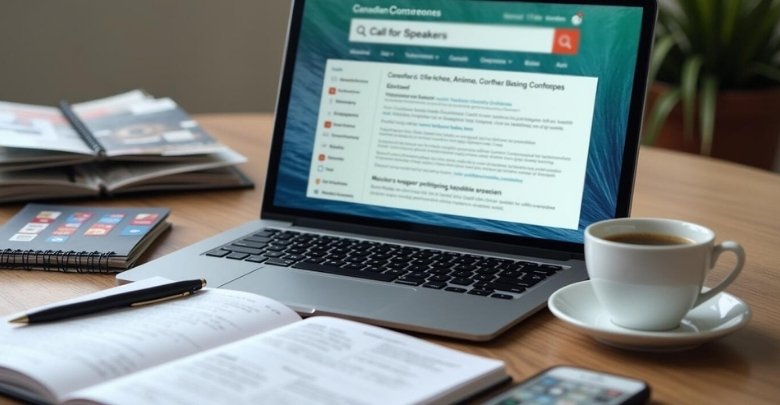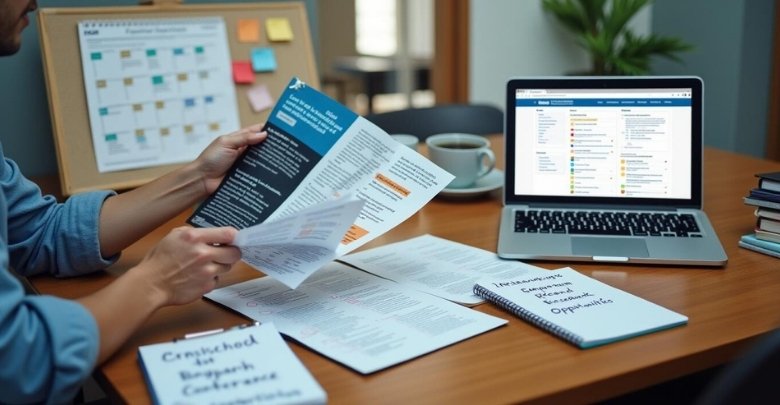As the world becomes increasingly connected, professionals and enthusiasts constantly search for conferences to grow, learn, and network. However, the sheer number of events happening globally can make finding the right one daunting. So, what is the best way to find conferences?
As you know, there are different methods of finding a conference. However, the most effective way to find conferences is by using listing websites like Global Conference Alliance, Eventbrite, and 10times.
These platforms offer extensive event listings, allowing you to search and filter by industry, location, and date. This makes it easy to find and choose conferences that match your interests and goals. Continue reading as we explore more about these resources and how they can optimize your conference search.
What is the Best Way to Find Conferences?
It is best to start by exploring popular listing websites in order to find the best conferences. A number of websites, such as Global Conference Alliance and Eventbrite simplify the process by offering detailed event information. You can filter these events by industry, location, and date, making it simple to match your specific interests. This approach ensures you never miss an upcoming conference that could benefit your career or personal growth.

Using platforms like 10times also helps in identifying ideal conferences quickly. These websites are user-friendly and designed to help you find events that align with your goals. Make sure to review each conference’s details to choose the best one. By utilizing these resources, you can efficiently plan your conference attendance and maximize your learning opportunities.
Additions Methods of Finding a Conference
Beyond traditional search methods, there are numerous creative ways to uncover valuable events. The following methods can help you stay ahead of your competitors in your chosen field if you use them correctly.
Utilize Professional Associations and Societies
Professional associations host annual conferences to bring industry experts and enthusiasts together. Explore their websites for event announcements and speaker opportunities. These platforms often provide valuable insights into the industry’s current trends and developments.
Membership in such associations keeps you updated about relevant conferences. Many even offer early-bird registration for members, ensuring great deals. If you’re passionate about contributing, look for open calls for speakers or panelists.
Explore Academic Institutions
Universities and research centers frequently organize events that align with academic and industry interests. Check their websites to uncover fascinating conferences. These events often feature thought leaders, making them excellent opportunities for knowledge-sharing and networking.
Additionally, many universities publicize conferences via their departmental newsletters. Subscribing to these can help you identify niche, high-quality events. Look for interdisciplinary conferences for exposure to diverse perspectives.
Utilize Social Media Platforms
Social media is a goldmine for discovering conferences. Follow industry leaders on LinkedIn for real-time updates about relevant events. Search for hashtags on Twitter like #TechConference or #BusinessSummit to find niche events easily.
Engage in discussions with peers about events they’re planning to attend. Networking through platforms often leads to insider tips. Active participation can uncover events not widely advertised elsewhere.
Keep an Eye on Academic Journals and Publications
Academic journals often include calls for papers or event announcements. These notices feature details about submission deadlines and event schedules. Subscribing to reputable journals ensures you stay informed about upcoming opportunities.
Many journals partner with conference organizers to promote related events. This provides a direct pathway to relevant academic or industry-specific gatherings. Regularly scanning these publications can keep you ahead of the curve.
Subscribe to Email Newsletters and Alerts
Industry newsletters frequently highlight upcoming events worth exploring. These newsletters offer curated lists of conferences relevant to your field. Subscription ensures timely updates on new opportunities.
Conference alert services provide customized notifications based on your preferences. These services save time by sending targeted event suggestions. Signing up for multiple alerts can expand your conference options.
Rely on Word of Mouth and Networking
Recommendations from colleagues and mentors often lead to valuable discoveries. Peers can share first-hand experiences and advice about conferences they’ve attended. Trustworthy recommendations help you avoid less impactful events.
Professional networks like alumni associations are also rich sources of information. Engaging in conversations with like-minded professionals opens doors to hidden opportunities. Leveraging your connections simplifies the search for high-quality events.
How Do These Listing Websites Work?
Conference listing websites bridge the gap between event organizers and attendees, simplifying the search for relevant gatherings. These platforms streamline the entire process from discovery to attendance. Let’s explore the detailed workings of these websites.
Event Submission
Conference organizers upload details about their events, such as dates, locations, and topics. These platforms compile all information into searchable, comprehensive listings. This centralization makes it easy for potential attendees to find relevant events. Users benefit from having access to a wide array of conference options in one place.
Search and Filter Options
Users can search for events based on location, date, topic, or industry. Advanced filtering tools refine search results, making it easier to find conferences that match specific interests. This functionality enhances the user experience by saving time and improving event discovery. Tailored searches lead directly to events that cater to individual professional needs.
Detailed Event Information
Each listing provides a detailed description, including the agenda, speakers, and fees. Profiles of keynote speakers and presenters are also featured, aiding attendees in deciding which events to join. This comprehensive approach helps users gauge the relevance and value of a conference. Knowing event specifics in advance allows for better planning and preparation.
User Reviews and Ratings
Websites often include reviews and ratings from past attendees, offering insights into the event’s quality. This feedback is crucial for gauging the success and reputation of conferences. Community interactions on the platform further aid in making informed decisions. Engaging with past participants provides a realistic expectation of the event.
Registration and Booking
Direct registration links on these websites connect users to event sign-up pages smoothly, including opportunities to get conferences in Canada in 2025 with a free invitation letter. These platforms also assist with booking travel and accommodations. This comprehensive integration simplifies the planning of the entire trip. Hassle-free arrangements are a major advantage for attendees, making the conference experience more accessible and enjoyable.
Notifications and Alerts
Users can opt into email alerts and push notifications to stay updated on upcoming events. These notifications ensure that attendees never miss important deadlines or announcements. Keeping users informed about new conferences helps maintain engagement. Timely alerts are key to capturing and retaining user interest.
Analytics and Insights
Event organizers receive analytics about attendee demographics and engagement levels. This data is invaluable for refining future events and tailoring them to meet attendee needs better. Insights into industry trends and popular topics help attendees stay ahead professionally. Both organizers and users benefit from a deeper understanding of event dynamics.
The Challenges You Might Face While Finding the Conference
Finding the perfect conference isn’t always straightforward; several hurdles can complicate the process. Understanding these challenges can help you navigate them effectively. Let’s delve into the common obstacles you might face while searching for the right conference.
- Information Overload: Too many options can overwhelm you, making it tough to spot the ideal conferences. Quality varies widely, and discerning valuable events requires keen insight.
- Limited Time and Resources: Fitting conferences into a busy schedule is often challenging. Costs for attendance, travel, and accommodations can quickly accumulate.
- Relevance and Focus: It’s essential to match conference topics with your professional interests and goals. The right audience enhances networking and learning opportunities.
- Geographical Barriers: Traveling to international conferences might be hindered by visa issues or other restrictions. Local events might not always meet your needs for quality and content.
- Application and Acceptance: Gaining a spot as a speaker at top conferences involves competitive proposals. Staying on top of submission deadlines is essential and can be stressful.
- Finding Reliable Sources: Verifying the accuracy of conference information can prevent wasted effort. Watch out for scams that promise much but deliver little.
- Networking Opportunities: Initiating connections before the conference can maximize networking but requires access to the right tools. Evaluating the engagement level of attendees is also key.
- Staying Updated: Conferences can change dates or locations, necessitating regular checks for updates. Adapting to virtual or hybrid formats presents additional challenges.
- Personal and Professional Commitments: Balancing work, life, and conference planning is demanding. Support from your employer is often necessary but can require justification of the conference’s value.
- Language and Cultural Barriers: Language differences can limit your ability to engage fully at an international conference. Cultural nuances also require sensitivity and understanding.
What to Look for in a Conference to Align Your Goals?
Choosing the right conference is crucial for maximizing professional development and networking opportunities. It’s about aligning the event’s offerings with your personal and career goals. Here’s how to identify the best conferences that can propel you forward.
Relevance of Topics
Ensure the conference topics resonate with your current professional interests and goals. Look for sessions that address the latest trends and challenges in your industry. This relevance is essential for applying learned insights practically. To select a good conference, ensure a good match that will enhance your expertise and keep you updated.
Quality of Speakers
Research the speakers to assess their credibility and the value they might offer. Esteemed speakers often bring transformative insights and real-world experience. They should have a proven track record of influence in your field. Engaging with top-tier professionals can significantly enrich your learning.
Networking Potential
Consider the networking opportunities available at the conference. A good conference will attract like-minded professionals, offering excellent networking scopes. Look for events that facilitate interactions through workshops and networking sessions. These connections can be invaluable for future collaborations and growth.
Organizational Details
Pay attention to the organization and structure of the conference. Well-organized events provide clear agendas, punctual sessions, and seamless logistics. A smooth experience will allow you to focus more on the content and less on logistical issues. Proper organization reflects the quality of the conference.
Attendee Feedback
Look for reviews and feedback from past attendees to gauge the conference’s impact. Positive feedback is a strong indicator of a worthwhile conference. Attendee experiences can highlight the strengths and weaknesses of the event. This insight helps you make an informed decision.
Accessibility and Support
Check the accessibility of the venue and the inclusivity of the event. Ensure there are adequate support services, like translation or mobility assistance if needed. Conferences that prioritize attendee comfort create a more welcoming environment. This consideration is vital for a positive experience.
Value for Investment
Evaluate the cost against the potential benefits of attending. Consider travel expenses, registration fees, and time away from work. A conference should be worth the investment in terms of learning and networking opportunities. Effective cost-benefit analysis is key to making the right choice.
Why It’s Important to Match Conferences With Your Goals?
Aligning conferences with your professional goals isn’t just beneficial—it’s essential. Attending the right conferences can drive your career forward and expand your network effectively. Let’s explore why it’s crucial to choose events that match your ambitions.
- Direct Relevance to Professional Development: Conferences specific to your goals can provide specific skills and knowledge. This targeted learning advances your career more efficiently.
- Maximized Return on Investment: Choosing relevant conferences ensures that your time and resources are spent wisely. You gain more value from sessions that directly benefit your career path.
- Networking With Purpose: Conferences that align with your goals attract professionals with similar interests. These connections are more likely to lead to meaningful collaborations and opportunities.
- Enhanced Engagement: You’re more likely to engage deeply with content that resonates with your professional needs. High engagement translates to better retention of information and ideas.
- Increased Visibility in Your Field: Attending the right conferences raises your profile among peers and industry leaders. This visibility can lead to invitations to speak or collaborate.
- Access to Modern Innovations: Conferences aligned with your goals often showcase the latest advancements in your field. Staying current with these innovations keeps you competitive.
- Personal Satisfaction and Motivation: Participating in conferences that reflect your interests boosts satisfaction and motivation. Enjoyment of the content makes the experience more rewarding.
FAQs About the Best Way to Find Conferences
Managing a vast array of conferences can be daunting. To help simplify your search and ensure you find events that best match your professional needs, here are some frequently asked questions about discovering the right conferences.
How Can I Use Social Media to Find Industry-Specific Conferences?
Follow relevant industry leaders and organizations on platforms like LinkedIn and Twitter. They often share announcements and updates about upcoming conferences, which can be a timely and efficient way to discover events.
What Role Do Professional Networks Play in Finding Conferences?
Joining professional networks or industry-specific groups can provide insider information on conferences. Members often share their experiences and recommendations for events that offer significant professional value.
Are There Benefits to Attending Both Local and International Conferences?
Attending local conferences can save on travel costs and time, while international conferences can offer broader networking opportunities and exposure to global trends. Balancing both can optimize your professional growth.
How Do I Evaluate the Quality of a Conference Before Attending?
Look for past attendee reviews, the caliber of speakers, and the relevance of session topics to your field. High-quality conferences will have transparent information available about their offerings and outcomes.
Can Attending Conferences Influence My Career Development?
Yes, attending conferences can significantly influence your career by providing networking opportunities, learning new industry trends, and increasing visibility within your professional community. Each event is a chance to enhance your resume and personal brand.
Closing Remarks
It takes a combination of strategy and insight to take advantage of the diverse world of professional conferences. By utilizing technology and networks, professionals can efficiently pinpoint events that align perfectly with their career objectives. Utilizing comprehensive listing websites such as Global Conference Alliance, Eventbrite, and 10times simplifies this process, making it accessible and practical.
These platforms provide valuable tools for filtering and searching that answer the question, “what is the best way to find conferences?” They ensure that every conference you choose to attend offers significant personal and professional benefits, enhancing your growth and broadening your industry connections in meaningful ways.







